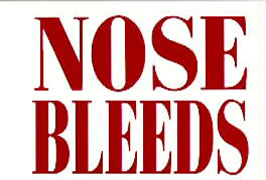Nosebleeds
A nosebleed can be very scary the first time it happens. When you look at your child all you see is blood every where. First relax, take a deep breath and remember a nosebleeds are messy and can be uncomfortable for the child but they are virtually never dangerous and the blood loss is almost always minimal. We at Familyfun have put some some tips to help you get through this situation.
A nosebleed Signs/Symptoms
A nosebleed is sudden bleeding from one or both nostrils, and may result from a variety of events: a punch in the nose, breathing dry air, allergies, or for no apparent reason. Nosebleeds are common. Most often they are a nuisance and not a true medical problem. But they can be both.
Treatment for Nosebleeds
-
Stand or sit upright and tilt head well forward (never tilt the head backwards!).
-
Ask the casualty to pinch just below the bridge of their nose. If they are too young, simply ask them to breathe through their mouth and you can pinch just below the bridge of their nose for them.
-
Try to avoid the casualty coughing, breathing through their nose, sniffing or blowing their nose as this will prevent blood clots forming and stopping the bleed.
-
After 10 minutes release the pressure on the nose. If the nose is still bleeding then reapply pressure for a further 10 minutes.
-
If bleeding persists for over 30 minutes seek medical assistance.
-
When the bleeding subsides gently clean the nose and mouth area with warm water, keeping the head tilted forward.
-
Allow the casualty to rest for a number of hours, refraining from shouting, sneezing, coughing etc. which will disturb any blood clots which have formed.
What not to do:
Do not tilt the casualties head back as the blood may drain down their throat and induce vomiting.
Preventing A Nosebleed
- Never pick your nose – You may be tempting, but the more you pick, the more likely you are to start bleeding.
- When playing sport wear the right safety gear.








